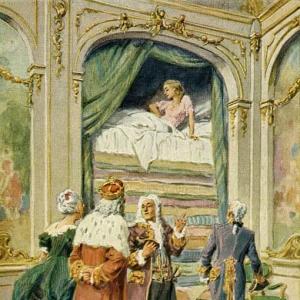Reading time: 13 min
In olden times, when the Lord himself still used to walk about on this earth amongst men, it once happened that he was tired and overtaken by the darkness before he could reach an inn. Now there stood on the road before him two houses facing each other. The one large and beautiful, the other small and poor. The large one belonged to a rich man, and the small one to a poor man.
Then the Lord thought, „I shall be no burden to the rich man, I will stay the night with him.“ When the rich man heard some one knocking at his door, he opened the window and asked the stranger what he wanted. The Lord answered, „I only ask for a night’s lodging.“
Then the rich man looked at the traveler from head to foot, and as the Lord was wearing common clothes, and did not look like one who had much money in his pocket, he shook his head, and said, „No, I cannot take you in, my rooms are full of herbs and seeds; and if I were to lodge everyone who knocked at my door, I might very soon go begging myself. Go somewhere else for a lodging,“ and with this he shut down the window and left the Lord standing there.
So the Lord turned his back on the rich man, and went across to the small house and knocked. He had hardly done so when the poor man opened the little door and bade the traveler come in. „Pass the night with me, it is already dark,“ said he; „you cannot go any further to-night.“ This pleased the Lord, and he went in.
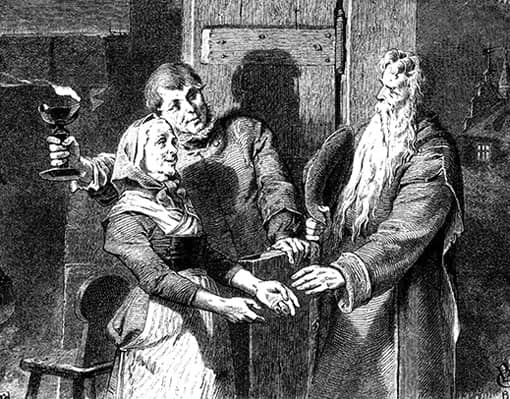
The poor man’s wife shook hands with him, and welcomed him, and said he was to make himself at home and put up with what they had got. They had not much to offer him, but what they had they would give him with all their hearts. Then she put the potatoes on the fire, and while they were boiling, she milked the goat, that they might have a little milk with them. When the cloth was laid, the Lord sat down with the man and his wife, and he enjoyed their coarse food, for there were happy faces at the table. When they had had supper and it was bed-time, the woman called her husband apart and said, „Hark you, dear husband, let us make up a bed of straw for ourselves to-night, and then the poor traveler can sleep in our bed and have a good rest, for he has been walking the whole day through, and that makes one weary.“ – „With all my heart,“ he answered, „I will go and offer it to him;“ and he went to the stranger and invited him, if he had no objection, to sleep in their bed and rest his limbs properly.
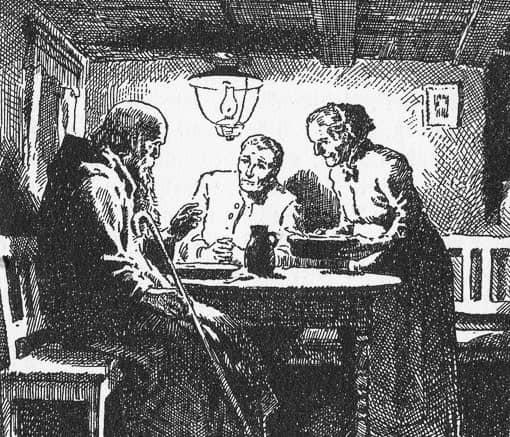
But the Lord was unwilling to take their bed from the two old folks. However, they would not be satisfied, until at length he did it and lay down in their bed, while they themselves lay on some straw on the ground.
Next morning they got up before daybreak, and made as good a breakfast as they could for the guest. When the sun shone in through the little window, and the Lord had got up, he again ate with them, and then prepared to set out on his journey.
But as he was standing at the door he turned round and said, „As you are so kind and good, you may wish three things for yourselves and I will grant them.“ Then the man said, „What else should I wish for but eternal happiness, and that we two, as long as we live, may be healthy and have every day our daily bread. For the third wish, I do not know what to have.“ And the Lord said to him, „Will you wish for a new house instead of this old one?“ – „Oh, yes,“ said the man; „if I can have that, too, I should like it very much.“ And the Lord fulfilled his wish, and changed their old house into a new one, again gave them his blessing, and went on.
The sun was high when the rich man got up and leaned out of his window and saw, on the opposite side of the way, a new clean-looking house with red tiles and bright windows where the old hut used to be. He was very much astonished, and called his wife and said to her, „Tell me, what can have happened? Last night there was a miserable little hut standing there, and today there is a beautiful new house. Run over and see how that has come to pass.“
So his wife went and asked the poor man, and he said to her, „Yesterday evening a traveler came here and asked for a night’s lodging, and this morning when he took leave of us he granted us three wishes — eternal happiness, health during this life and our daily bread as well, and besides this, a beautiful new house instead of our old hut.“
When the rich man’s wife heard this, she ran back in haste and told her husband how it had happened. The man said, „I could tear myself to pieces! If I had but known that! That traveler came to our house too, and wanted to sleep here, and I sent him away.“ – „Quick!“ said his wife, „get on your horse. You can still catch the man up, and then you must ask to have three wishes granted to you.“
The rich man followed the good counsel and galloped away on his horse, and soon came up with the Lord. He spoke to him softly and pleasantly, and begged him not to take it amiss that he had not let him in directly. He was looking for the front-door key, and in the meantime the stranger had gone away, if he returned the same way he must come and stay with him. „Yes,“ said the Lord; „if I ever come back again, I will do so.“ Then the rich man asked if might not wish for three things too, as his neighbor had done? „Yes,“ said the Lord, he might, but it would not be to his advantage, and he had better not wish for anything; but the rich man thought that he could easily ask for something which would add to his happiness, if he only knew that it would be granted. So the Lord said to him, „Ride home, then, and three wishes which you shall form, shall be fulfilled.“
The rich man had now gained what he wanted, so he rode home, and began to consider what he should wish for. As he was thus thinking he let the bridle fall, and the horse began to caper about, so that he was continually disturbed in his meditations, and could not collect his thoughts at all. He patted its neck, and said, „Gently, Lisa,“ but the horse only began new tricks. Then at last he was angry, and cried quite impatiently, „I wish your neck was broken!“ Directly he had said the words, down the horse fell on the ground, and there it lay dead and never moved again. And thus was his first wish fulfilled. As he was miserly by nature, he did not like to leave the harness lying there. So he cut it off, and put it on his back; and now he had to go on foot. „I have still two wishes left,“ said he, and comforted himself with that thought.
And now as he was walking slowly through the sand, and the sun was burning hot at noon-day, he grew quite hot-tempered and angry. The saddle hurt his back, and he had not yet any idea what to wish for. „If I were to wish for all the riches and treasures in the world,“ said he to himself, „I should still to think of all kinds of other things later on, I know that, beforehand. But I will manage so that there is nothing at all left me to wish for afterwards.“ Then he sighed and said, „Ah, if I were but that Bavarian peasant, who likewise had three wishes granted to him, and knew quite well what to do, and in the first place wished for a great deal of beer, and in the second for as much beer as he was able to drink, and in the third for a barrel of beer into the bargain.“
Many a time he thought he had found it, but then it seemed to him to be, after all, too little. Then it came into his mind, what an easy life his wife had, for she stayed at home in a cool room and enjoyed herself. This really did vex him, and before he was aware, he said, „I just wish she was sitting there on this saddle, and could not get off it, instead of my having to drag it along on my back.“ And as the last word was spoken, the saddle disappeared from his back, and he saw that his second wish had been fulfilled. Then he really did feel warm. He began to run and wanted to be quite alone in his own room at home, to think of something really large for his last wish. But when he arrived there and opened the parlour-door, he saw his wife sitting in the middle of the room on the saddle, crying and complaining, and quite unable to get off it.
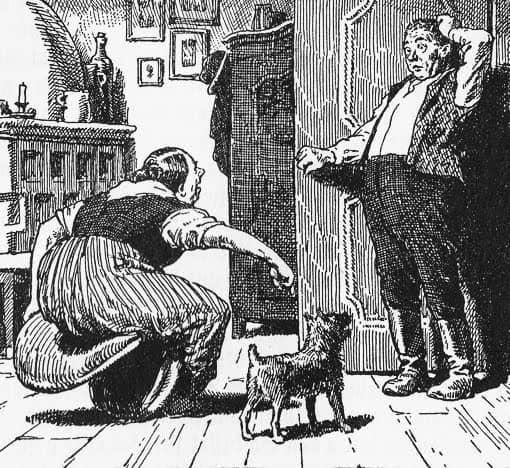
So he said, „Do bear it, and I will wish for all the riches on earth for thee, only stay where thou art.“ She, however, called him a fool, and said, „What good will all the riches on earth do me, if I am to sit on this saddle? Thou hast wished me on it, so thou must help me off.“ So whether he would or not, he was forced to let his third wish be that she should be quit of the saddle, and able to get off it, and immediately the wish was fulfilled. So he got nothing by it but vexation, trouble, abuse, and the loss of his horse; but the poor people lived happily, quietly, and piously until their happy death.
 Learn languages. Double-tap on a word.Learn languages in context with Childstories.org and Deepl.com.
Learn languages. Double-tap on a word.Learn languages in context with Childstories.org and Deepl.com.Backgrounds
Interpretations
Adaptions
Summary
Linguistics
„The Poor Man and the Rich Man“ is a fairy tale from the collection of German folklore compiled by the Brothers Grimm, Jacob and Wilhelm. The Brothers Grimm were German academics, linguists, and cultural researchers who published their collection of folktales in the early 19th century. Their collection, known as „Grimms‘ Fairy Tales“ or „Kinder- und Hausmärchen“ (Children’s and Household Tales), contains over 200 stories and has become a significant part of Western literary tradition.
The Grimms collected their stories from various sources, including oral tradition and written texts, intending to preserve German cultural heritage and folklore. Although the Brothers Grimm did not create these stories, they did edit and adapt them to fit their moral and stylistic standards. The tales they collected often revolve around themes such as morality, supernatural events, and the consequences of human nature.
„The Poor Man and the Rich Man“ is one such tale that teaches important lessons about humility, kindness, contentment, and the consequences of greed. Like many of the Grimms‘ fairy tales, this story uses supernatural elements and characters, such as the Lord visiting Earth and granting wishes, to convey its moral messages.
„The Poor Man and the Rich Man“ offers several interpretations that revolve around themes of humility, kindness, contentment, and the consequences of greed.
Humility and kindness: The poor couple displays humility and kindness by welcoming the Lord into their home without hesitation, despite having limited resources. Their actions are rewarded with blessings, illustrating the importance of treating others with kindness and compassion.
Contentment and gratitude: The poor couple is content with their simple life, and their wishes reflect their desire for a peaceful and fulfilling existence. They appreciate what they have and focus on their well-being and happiness rather than material wealth. This attitude is rewarded with a happy and pious life, emphasizing the value of contentment and gratitude.
Greed and its consequences: The rich man’s greed leads him to make poorly considered wishes, ultimately leaving him with nothing but frustration and disappointment. He is too focused on material wealth and fails to consider the long-term effects of his wishes. This serves as a cautionary tale, warning readers of the dangers of greed and the importance of prioritizing values over material possessions.
The dangers of envy: The rich man becomes envious of the poor man’s newfound fortune, which drives him to chase after the Lord for his own wishes. His envy blinds him from making wise decisions, leading to negative outcomes. This highlights the detrimental effects envy can have on a person’s life.
Divine intervention and the importance of faith: The Lord’s visit to Earth and his interactions with the two men demonstrate the power of divine intervention and the significance of faith. The poor couple’s faith in the Lord brings them blessings, while the rich man’s lack of faith and focus on material wealth results in his downfall.
In summary, „The Poor Man and the Rich Man“ offers valuable lessons on the importance of humility, kindness, contentment, and faith, while warning against the dangers of greed and envy. The tale encourages readers to appreciate what they have and prioritize values over material possessions.
„The Poor Man and the Rich Man“ is a popular fairy tale that has been adapted in various forms of literature, film, and theater over the years. Here are some notable adaptations:
Operas and musicals: The story has been adapted into several operas and musicals, including „The Poor Man and the Rich Man“ by Ernst Krenek and „Porgy and Bess“ by George Gershwin.
Films and TV shows: The tale has been adapted into numerous films and TV shows, including the German film „Der Arme und der Reiche“ (1928) and the episode „The Rich Man, the Poor Man and the Butler“ of the TV series „Alfred Hitchcock Presents“ (1961).
Children’s books: The story has been retold in various forms of children’s literature, including picture books and early reader books.
Theater: The story has been adapted for the stage in various forms, including puppet shows and plays for children.
Overall, „The Poor Man and the Rich Man“ is a classic tale that has remained popular and enduring, inspiring numerous adaptations and interpretations over the years.
„The Poor Man and the Rich Man“ is a fairy tale by Brothers Grimm that tells the story of the Lord visiting Earth and seeking shelter in two houses, one belonging to a rich man and the other to a poor man. When the Lord arrives at the rich man’s house, he is turned away because the rich man believes he has nothing to offer. The Lord then approaches the poor man’s house, where he is welcomed with open arms and a humble meal. The poor couple even offer their own bed for the Lord to sleep in, while they sleep on straw on the ground.
In the morning, the Lord grants the poor couple three wishes. They wish for eternal happiness, health, and daily bread for the rest of their lives. The Lord also offers to replace their old house with a new one. The poor couple is grateful and live happily ever after.
Meanwhile, the rich man learns of the poor man’s fortune and chases after the Lord to ask for three wishes of his own. The Lord warns him that it would not be to his advantage but grants the wishes nonetheless. The rich man struggles to think of what to wish for and accidentally wishes for his horse’s neck to be broken, which is immediately fulfilled. He then wishes for his wife to be stuck on the horse’s saddle, which also comes true. Finally, he is forced to use his last wish to free his wife from the saddle, leaving him with nothing but disappointment, frustration, and the loss of his horse.
In contrast to the poor couple, who lived happily and piously, the rich man gained nothing but misery from his wishes, demonstrating the importance of humility, kindness, and contentment.
The fairy tale „The Poor Man and the Rich Man“ by the Brothers Grimm presents a rich tapestry for linguistic analysis, touching upon themes of morality, divine justice, and the human condition. Here are some key aspects of the linguistic and thematic analysis:
Contrast and Juxtaposition: The story uses contrast heavily, particularly in the description of the rich and poor man’s circumstances. The juxtaposition of the „large and beautiful“ house with the „small and poor“ one, and the corresponding attitudes of the rich and poor men towards the Lord, highlights the moral lesson of the tale: generosity and contentment lead to true wealth.
Characterization through Dialogue: Dialogue is used effectively to characterize the two main human protagonists. The rich man’s dismissive and self-preserving excuses contrast sharply with the warm, welcoming words of the poor man. This dialogue not only develops their characters but also subtly critiques social attitudes towards wealth and poverty.
Syntax and Sentence Structure: The narrative flow transitions seamlessly between descriptive prose and dialogue, employing a straightforward and unadorned syntactical structure. This simplicity is characteristic of oral storytelling, making the moral lessons accessible to a broad audience.
Symbolism: Several symbols are employed to reinforce thematic elements. The choice of everyday objects like potatoes, goat’s milk, and straw beds in the poor man’s home suggests contentment with simple, honest living. In contrast, the rich man’s preoccupation with material wealth and the outcome of his wishes signify greed and discontent, ultimately leading to his downfall.
Moral and Didactic Elements: The narrative’s didactic purpose is supported by the Lord’s role, who functions as a divine arbiter and enforcer of justice. The three wishes motif serves as a test of the characters‘ virtues and priorities, highlighting the consequences of their choices.
Irony and Satire: The story employs irony, particularly through the wishes granted to the rich man. His inability to effectively use his wishes, resulting in more inconvenience than benefit, satirizes the folly of greed and self-centeredness.
Repetition for Emphasis: Repetitive structures, such as the rich man’s repeated failure to form a coherent wish and the emphasis on the poor man’s hospitality, serve to reinforce the moral message.
Cultural and Historical Context: The presence of the Lord in human form, walking among people, reflects the tale’s roots in a Christian moral framework typical of the Brothers Grimm’s time. This divine element underscores the overarching theme of divine justice prevalent in folk and fairy tales.
In sum, the linguistic elements in „The Poor Man and the Rich Man“ work synergistically to deliver a powerful moral lesson. The contrast between the two men, both in their actions and the language associated with them, encapsulates the values esteemed by the Brothers Grimm and the culture they represented.
Information for scientific analysis
Fairy tale statistics | Value |
|---|---|
| Number | KHM 87 |
| Aarne-Thompson-Uther-Index | ATU Typ 750A |
| Translations | DE, EN, DA, ES, FR, PT, FI, HU, IT, JA, NL, PL, RU, TR, VI, ZH |
| Readability Index by Björnsson | 32.2 |
| Flesch-Reading-Ease Index | 80.7 |
| Flesch–Kincaid Grade-Level | 7.8 |
| Gunning Fog Index | 10.9 |
| Coleman–Liau Index | 6.7 |
| SMOG Index | 8.7 |
| Automated Readability Index | 8.3 |
| Character Count | 8.730 |
| Letter Count | 6.635 |
| Sentence Count | 74 |
| Word Count | 1.738 |
| Average Words per Sentence | 23,49 |
| Words with more than 6 letters | 152 |
| Percentage of long words | 8.7% |
| Number of Syllables | 2.102 |
| Average Syllables per Word | 1,21 |
| Words with three Syllables | 68 |
| Percentage Words with three Syllables | 3.9% |
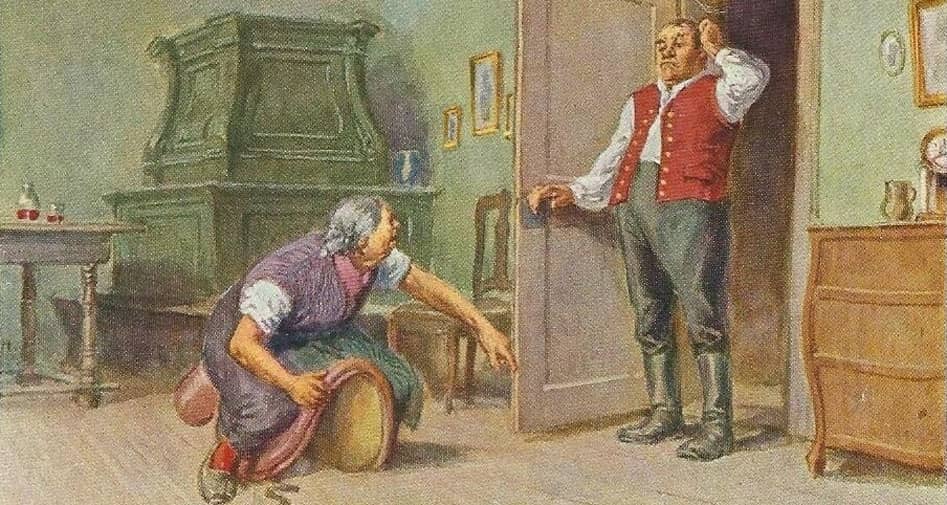
 Facebook
Facebook  Whatsapp
Whatsapp  Messenger
Messenger  Telegram
Telegram Reddit
Reddit